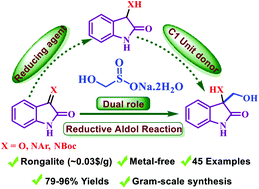Rongalite-induced transition-metal and hydride-free reductive aldol reaction: a rapid access to 3,3′-disubstituted oxindoles and its mechanistic studies†
Abstract
A transition-metal and hydride-free reductive aldol reaction has been developed for the synthesis of biologically active 3,3′-disubstituted oxindoles from isatin derivatives using rongalite. In this protocol, rongalite plays a dual role as a hydride-free reducing agent and a C1 unit donor. This transition metal-free method enables the synthesis of a wide range of 3-hydroxy-3-hydroxymethyloxindoles and 3-amino-3-hydroxymethyloxindoles with 79–96% yields. One-pot reductive hydroxymethylation, inexpensive rongalite (ca. $0.03/1 g), mild reaction conditions and short reaction time are some of the key features of this synthetic method. This protocol is also applicable to gram scale synthesis.

- This article is part of the themed collection: Synthetic methodology in OBC


 Please wait while we load your content...
Please wait while we load your content...